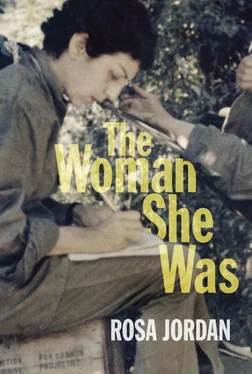By the shortest route it was a mere kilometre to the restaurant, but she chose a more meandering route through Parque Lenin, past rowboats on the lake and children flying kites in open fields. She heard in the near distance the toot of a little choo-choo train taking families around the park, and farther away, the whistle of a larger one, which, now that it was late afternoon, would be taking others back to the city. The drive gave her an extra few minutes to consider what had happened back there in the garden, time to wonder why, although it had alarmed her, she felt a lingering sense of exhilaration.
Psychiatry was not Celia’s area of expertise, but her medical training told her that whatever tricks her mind had played on her must have sprung from some brief aberration in brain chemistry. She would have to consider the implications of that later, and perhaps seek a second opinion. But now she must hurry, because Luis was waiting, had been waiting for—she was not sure how long.
LUIS LAGO approved of Las Ruinas’ Soviet-inspired architecture. It did not bother him that the restaurant, monstrous in size, with heavy horizontal lines painted dazzling white, seemed as out of place in its wooded setting as a luxury liner in an orange grove. Its weightiness promised the durability of Cuba’s colonial construction, while clean lines implied a purity of purpose lacking in edifices of that ostentatious era. But the place was expensive. Luis was here only because of the location, and because Celia liked it.
It was his discovery, three years ago, that she bussed out to Parque Lenin every year to visit the Sánchez museum, his offering to drive her, and inviting her to dine at Las Ruinas afterwards, that had led to their engagement. Naturally he would have liked to visit the museum with her, but she made it clear at the onset that she wanted to go alone.
He assured her that he didn’t mind waiting at the restaurant. He really didn’t mind. It was a small thing and helped fill a void in their relationship—his nagging sense that nothing he had to offer was particularly important to her. He could not fault her courtesy in acknowledging the things he did for her, but he sensed that it was more ritual than need. Celia Cantú asked for nothing.
Consciously he admired her quiet restraint as much as he had detested the voluble emotions flung at him by women with whom he had been involved when he was younger. Yet Celia’s self-containment was almost too complete. Luis knew that among family, friends, and co-workers he was most at ease when taking cues from the group. Celia, though, did not signal her desires. She had a kind of emotional opaqueness that left him perpetually unsure of what she wanted, how she felt, or, perhaps, even who she was.
Luis gave a disparaging grunt at that last, stupid thought. They had known each other since childhood. It had always been him watching her, not the other way around, so what could there be to know about her that he didn’t know already?
Even as he told himself this, Luis knew he was whistling in the dark. He did not know, for example, what her reaction would be to the letter in his pocket—a letter that he had kept to himself as long as possible.
A trickle of sweat slid down his spine. He moved into the shade of Las Ruinas’ cement-heavy portico. Unobtrusively dressed in a short-sleeved guayabera, grey slacks, and black shoes, he went unnoticed by a quince party posing for pictures in the restaurant’s flower-filled garden. Although he stood a head taller than most Cuban men, he rarely attracted attention. He had what he jokingly called “a talent for invisibility.” It had bothered him when he was a child, especially in the presence of his polar-opposite brother, but later, in politics, it was an asset. His input, never controversial but always thoughtful, was given consideration at the highest levels of government. From the outset he had aimed for an approach that would never be perceived as threatening. A genuine readiness to serve the Revolution in whatever capacity his colleagues deemed most useful had facilitated his rise in the ranks.
Luis watched a man, probably the fifteen-year-old’s father, snapping pictures. The man must be forty, which meant that like Luis he had been born soon after the victory of the Revolution and had grown up steeped in its values. But what good had it done? The fool had obviously spent a bundle of money, more likely the money of Miami relatives, to make an extravaganza of what Luis viewed as one of the bourgeoisie’s most obnoxious traditions.
The tight fit of the girl’s formal gown suggested that it had been purchased elsewhere by someone who remembered her as more slender than she was now. New outfits worn by the brothers, sisters, and cousins who surrounded her to simulate the escorts and attendants of a royal child were likely from Miami relatives too. In return, those who sent the crap would get copies of the photos that the proud father was snapping so feverishly. He probably imagined that the pictures would offer incontrovertible evidence that he had done right by his daughter; proof that although island Cubans lacked certain consumer goods, they had one thing that many Cuban emigrants did not: a close family that included happy, well-adjusted adolescents.
The girl’s father noticed Luis only when, trying to get an overview shot of the group, he actually backed into him. The man quickly apologized, then held out the camera. “Would you mind taking one of us all together? You know, with me in it?”
Luis hesitated and then accepted the camera. The man positioned himself next to his daughter, a pouty girl who would have been pretty without the mask of makeup.
“Ready!” The father beamed.
Luis snapped the shutter, only to be greeted by cries of “Aye, no! I had my mouth open!” “My eyes were closed!” “Otro, por favor!”
Luis took one more. He returned the camera with an expression meant to convey that he did not approve of the event or his small part in it.
The man did not seem to notice. He raced back to pose his daughter for other photos, tilting her chin, instructing her to smile. Luis saw that the girl was growing impatient with the mannequin treatment. At last she flopped onto a bench and refused to look up. The father shouted in exasperation. Then, seeing something in her sullen downcast eyes that the camera would translate into modesty, he gave a delighted, “Wait! Perfecto!” and snapped the picture.
Luis turned away, frowning, and saw Celia coming toward him. She was walking fast, almost trotting. The short dark curls, usually so tidy, had the messy look of a woman just up in the morning who only half-combed her hair, and without benefit of a mirror. Her smile was tense and did not reach her eyes.
Before he could ask what was wrong, she burst out, “Sorry I kept you waiting so long, Luis!”
“Long? Why, you haven’t been gone an hour!”
She stopped in her tracks and checked her watch, as if she couldn’t take his word.
He wondered why she seemed surprised. The museum was not five minutes away. “You didn’t stay as long as usual.”
“But I—you were frowning,” she said faintly. “I thought it was the waiting.”
“No. It’s that nonsense over there.” He jerked his head toward the quince party, which was being rearranged into yet another combination on the broad white steps leading into the restaurant.
Celia glanced toward to the group. “ Pobrecita! ” she exclaimed in a low voice. “Look at the swelling! Those shoes are so tight they have cut off circulation in her feet. And the way the high heels have thrust her pelvis forward; see how it exaggerates the curvature of her spine?”
Luis dropped an arm around Celia’s shoulder. “A girl that age ought to be spending the weekend at a campismo with friends, not enduring this, this charade!”
Читать дальше












